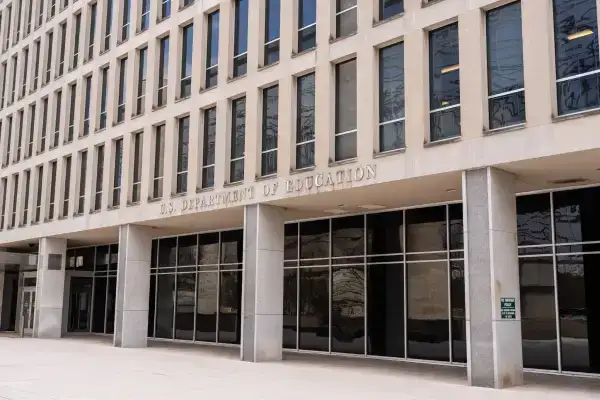education
The U.S. Education Department’s civil rights office is investigating five universities over scholarships exclusively for DACA or undocumented students, raising concerns over Title VI violations and higher‑ed equity policies under the Trump administration.

The U.S. Department of Education’s Office for Civil Rights has initiated formal investigations into five major universities over scholarship programs that appear to offer awards exclusively to students with Deferred Action for Childhood Arrivals (DACA) status or those who are undocumented, a move that critics say may violate Title VI of the Civil Rights Act by discriminating on the basis of national origin. The inquiry follows complaints filed by the conservative nonprofit Legal Insurrection Foundation’s Equal Protection Project, which allege that these institutional and private scholarship programs unlawfully exclude U.S.
citizens and lawful residents, potentially denying them fair access to educational opportunities because of their citizenship status. The five institutions named in the investigation are the University of Louisville, University of Nebraska Omaha (UNO), University of Miami, University of Michigan, and Western Michigan University, each of which offers scholarships described in their own materials as available only to DACA or undocumented students. Acting Assistant Secretary for Civil Rights Craig Trainor framed the probe within broader Trump administration “America first” rhetoric, stating that neither the administration’s policies nor Title VI allow universities to restrict scholarships on the basis of birth in the United States .
The scholarships under review include UNO’s Dreamer’s Pathway Scholarship, which supports Nebraska residents with DACA status, and the HDR Scholarship, which reportedly gives preference to under‑represented minority students—actions now flagged as potentially in breach of federal anti‑discrimination law . At the University of Louisville there is the Sagar Patagundi Scholarship; the University of Miami offers its U Dreamers Program; Western Michigan University has a dedicated Undocumented/DACA scholarship; and the University of Michigan awards its Dreamer Scholarship—all reserved for non‑citizen students and therefore under scrutiny . Legal and policy experts note that while DACA recipients cannot receive federal Pell grants or federal loans, they often rely heavily on privately funded, institutional, or state aid to attend college, making these scholarship programs vital—raising questions about the legality and fairness of excluding U.S.
citizens from competing . Universities under investigation have largely issued cautious responses, indicating they are reviewing their scholarship policies and cooperating with the Department of Education’s inquiry, but offering little public comment on specifics . The Department further confirmed that the scope of the investigation extends beyond DACA scholarships, probing whether other programs for students based on race, color or sexual orientation also run afoul of Title VI’s protections .
The Equal Protection Project’s founder, William A. Jacobson, hailed the investigations as validation of their complaints, asserting that denying U.S. citizens the chance to compete for scholarships based on origin is intolerable .
The investigation comes against a backdrop of broader federal scrutiny of universities, including separate State Department inquiry into Harvard’s eligibility to sponsor exchange visitors and previous actions targeting supposed ideological bias, antisemitism, or foreign influence at American colleges . Critics of the probe argue the move is a politically motivated attack on diversity, equity and inclusion (DEI) initiatives in higher education that gained momentum under prior administrations. They warn the enforcement threatens the support systems for marginalized students while chilling institutional innovation .
Supporters of the investigations contend that diversity policies, including scholarships for undocumented students, must comply with federal law and not disadvantage U.S. citizens, especially given recent Supreme Court decisions limiting race-based admissions . This latest development aligns with other Trump-era regulatory moves, including the dismissal of thousands of civil rights complaints and pressure on states to revoke in-state tuition benefits for undocumented students—signaling a sustained priority on limiting federal support for non‑citizen students .
As the inquiry advances, potential findings could force universities to revise eligibility criteria, redistributing financial aid packages and possibly affecting scholarship programs already in place, while also setting precedent for future civil rights enforcement in higher education. The outcome may influence ongoing debates about how public institutions balance support for immigrant students with equal educational access for domestic citizens. At stake is whether federally funded universities can continue offering targeted aid to DACA and undocumented students without running afoul of civil rights laws—especially in an administration that frames such programs as discriminatory.
The investigation is unfolding amid broader national discourse over immigration, access to higher education, and the role of government in shaping campus policy. It also highlights tensions between civil rights protections, minority outreach, and the legal mandates governing federally funded institutions. As universities await guidance, policy analysts and legal experts warn of consequences for student diversity, public trust in higher education, and institutional autonomy.
The five universities named must now undergo careful reviews of their scholarship frameworks, produce documentation for the OCR, and potentially modify or eliminate programs found to exclude American-born students. Meanwhile, advocates for immigrant rights and educational equity are likely to monitor developments closely, fearing erosion of support for vulnerable student populations. Whatever the outcome, the investigations mark a significant escalation in federal oversight of higher education fundraising and aid practices, reflecting a political era defined by ideological confrontation over who belongs in America's universities and who deserves institutional support..
Read More